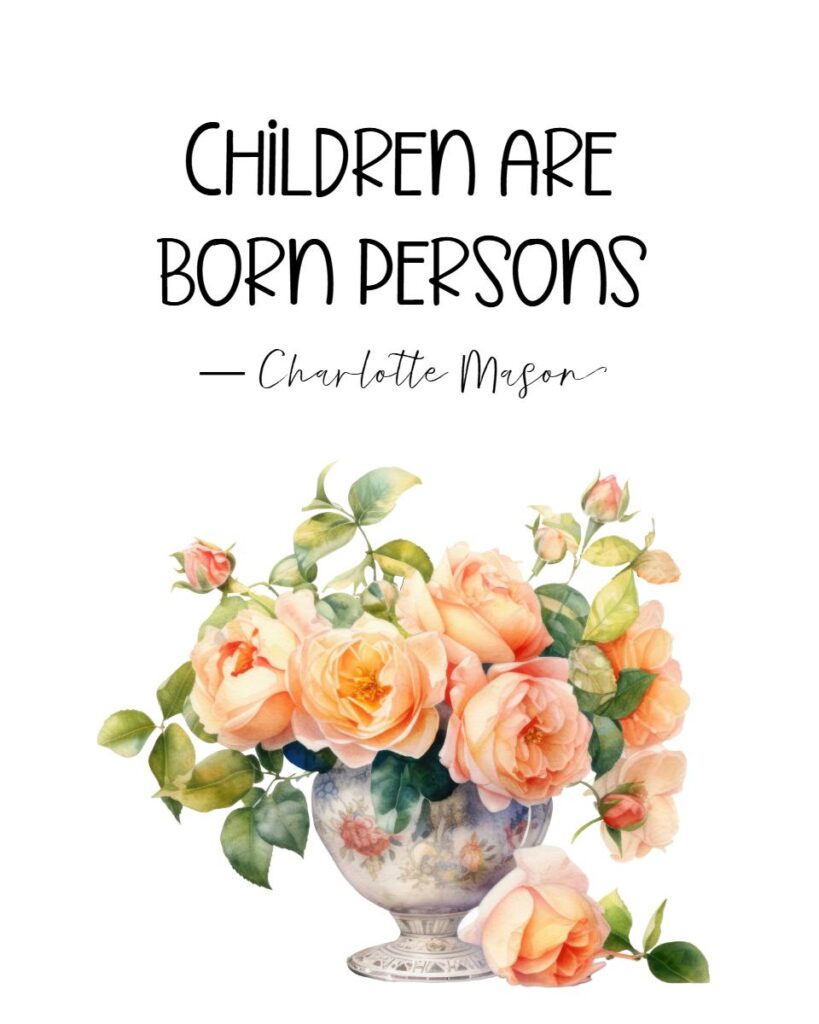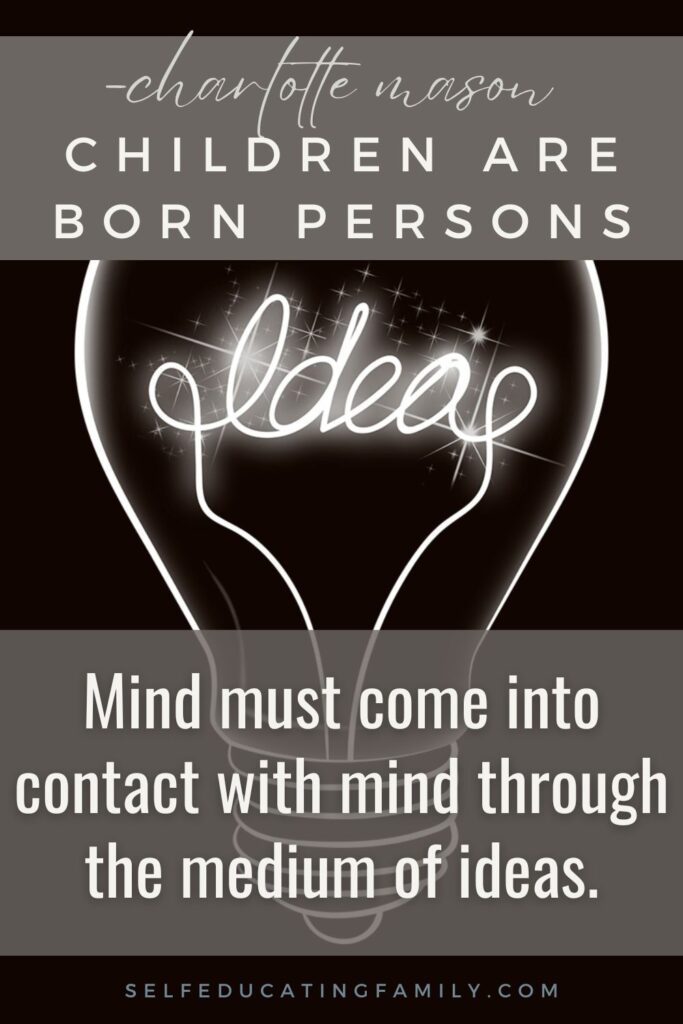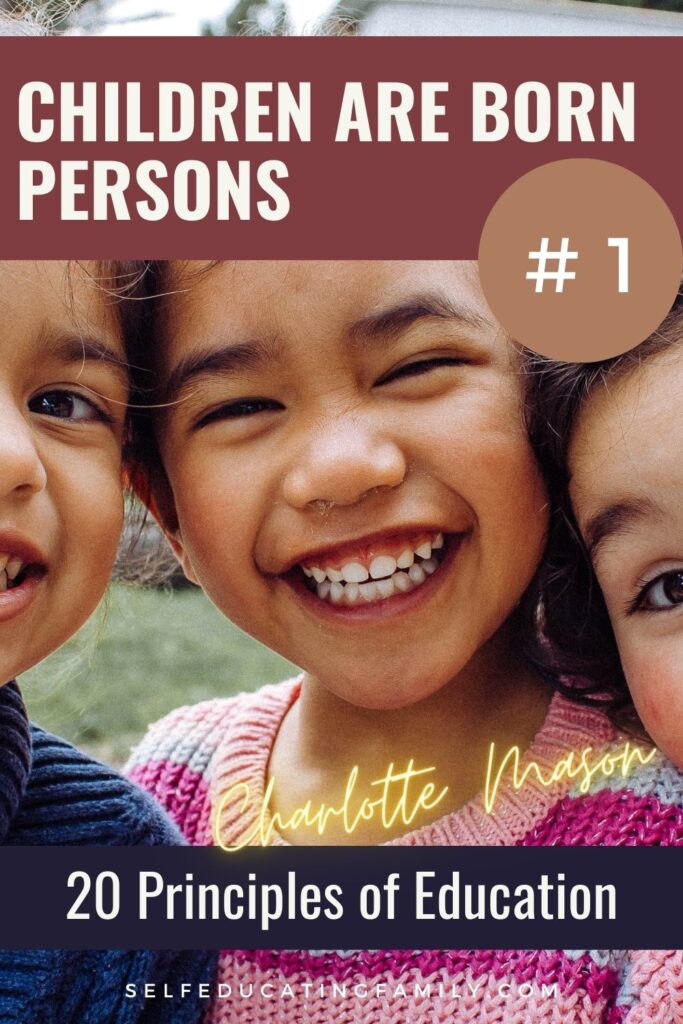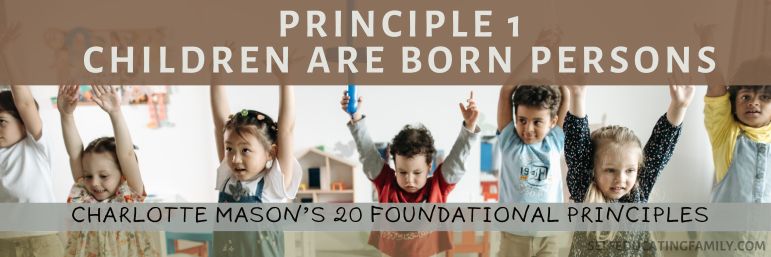Children are Born Persons
Charlotte Mason begins with the principle that children are born persons. In Chapter 2 of Book 1 of Volume 6: Towards a Philosophy of Education, she expounds this fundamental concept.
Background
We’ve been looking at each of Charlotte Mason’s “20 Principles” or “A Short Synopsis of the Educational Philosophy”.
- Charlotte Mason 20 Principles
- Charlotte Mason Principle #3: Authority & Teachability
- Principles 5-8: Education is an atmosphere, a discipline & a life
And so this post will look at the foundational principle: that children are born persons.

In addition, you should remember that Charlotte Mason (CM) was a British educator in the late 19th to early 20th century. She ran a school and trained teachers in what we call today the Charlotte Mason method.
Some of her ideas were extraordinarily forward-thinking. For instance, she believed that all children from all classes possessed the same potentialities. (In other words, rich people didn’t have smarter kids.) Today, while we may take for granted CM’s assumption that all kids have abundant possibilities, it was not a common idea at the time.
CM on “Children are born persons”
Chapter 2 looks at 3 areas:
- The Mind of a Child
- The Mind of a School Child, and
- Motives for Learning
We’ll grab some of the best quotes from CM in each section.
The Mind of a Child
CM primarily discusses young children in this section and she mentions that she goes into more detail in some of her earlier volumes. (Volume 1: Home Education and Volume 2: Parents & Children, in particular.)
But what is noteworthy is that kids love learning in this phase of life. And that they are unique beings with unique minds.
Note: all quotes are from Volume 6.
… that his mind is the instrument of his education and that his education does not produce his mind.
—pg 36
Life is a continual progress to a child. He does not go over old things in old ways; his joy is to go on.
— pg 36
Reason is present in the infant as truly as imagination. As soon as he can speak he lets us know that he has pondered the ’cause why’ of things and perplexes us with a thousand questions. His ‘why?’ is ceaseless. Nor are his reasonings always disinterested. How soon the little urchin learns to manage his nurse or mother, to calculate her moods and play upon her feelings! It is in him to be a little tyrant;
—pg 37
The mind of a School Child
CM moves on to children of school age.
“But we must leave the quite young child, fascinating as he is, and take him up again when he is ready for lessons.”
She takes up the idea again that the mind is the instrument:
Here, in a volume which is chiefly concerned with education in the sense of schooling, I am anxious to bring before teachers the fact that a child comes into their hands with a mind of amazing potentialities: he has a brain too, no doubt, the organ and instrument of that same mind, as a piano is not music but the instrument of music.
— pg 38
Feeding the mind becomes the primary message of the Children are Born Persons chapter:
Mind must come into contact with mind through the medium of ideas.
— pg 39

Our business is to give children the great ideas of life, of religion, history, science; but it is the ideas we must give, clothed upon with facts as they occur, and must leave the child to deal with these as he chooses.
—pg 40
I say ‘experience’ advisedly, for the word denotes the process by which children get to know. They experience all the things they hear and read of; these enter into them and are their life; and thus it is that ideas feed the mind in the most literal sense of the word ‘feed.’
—pg 40
And so a comment on why reading is good for kids:
They read between the lines and put in all the author has left out.
— pg 41
Another comment about artist study:
How many teachers know that children require no pictures excepting the pictures of great artists, which have quite another function than that of illustration?
—pg 41
And one about several disciplines found through reading living books:
History must afford its pageants, science its wonders, literature its intimacies, philosophy its speculations, religion its assurances to every man, and his education must have prepared him for wanderings in these realms of gold.
—pg 43
A final word rounding back to the concept of children being full-fledged persons:
It is not only a child’s intellect but his heart that comes to us thoroughly furnished.
—pg 43
Motives for learning
So then, CM looks at motivations for learning. Plus what teachers should do and not do to feed the children’s minds:
Now place a teacher before a class of persons the beauty and immensity of each one of whom I have tried to indicate and he will say, “What have I to offer them?” His dull routine lessons crumble into the dust they are when he faces children as they are.
—pg 44
He knows that children’s minds hunger at regular intervals as do their bodies; that they hunger for knowledge, not for information, and that his own poor stock of knowledge is not enough, his own desultory talk has not substance enough; that his irrelevant remarks interrupt a child’s train of thought; that, in a word, he is not sufficient for these things.
—pg 44
We also see CM discuss class differences (or lack thereof):
On the other hand, the children, the children of the slums especially, have no vocabulary to speak of, no background of thought derived from a cultured environment. They are like goodly pitchers, capable of holding much but with necks so narrow that only the thinnest stream can trickle in. So we have thought hitherto, and our teaching has been diluted to dishwater and the pitchers have gone empty away. —P 44
But when those less fortunate children are taught with CM methods, their “output” is no different from the more fortunate, which surprises some people, but she proved it over and over again.
To hear children of the slums ‘telling’ King Lear or Woodstock, by the hour if you will let them, or describing with minutest details Van Eyck’s Adoration of the Lamb or Botticelli’s Spring, is a surprise, a revelation.
—pg 45
…every child has been discovered to be a person of infinite possibilities.
—pg 45
And finally, to sum up: when taught with these methods, children will thrive:
Every one of these children knows that there are hundreds of pleasant places for the mind to roam in.

